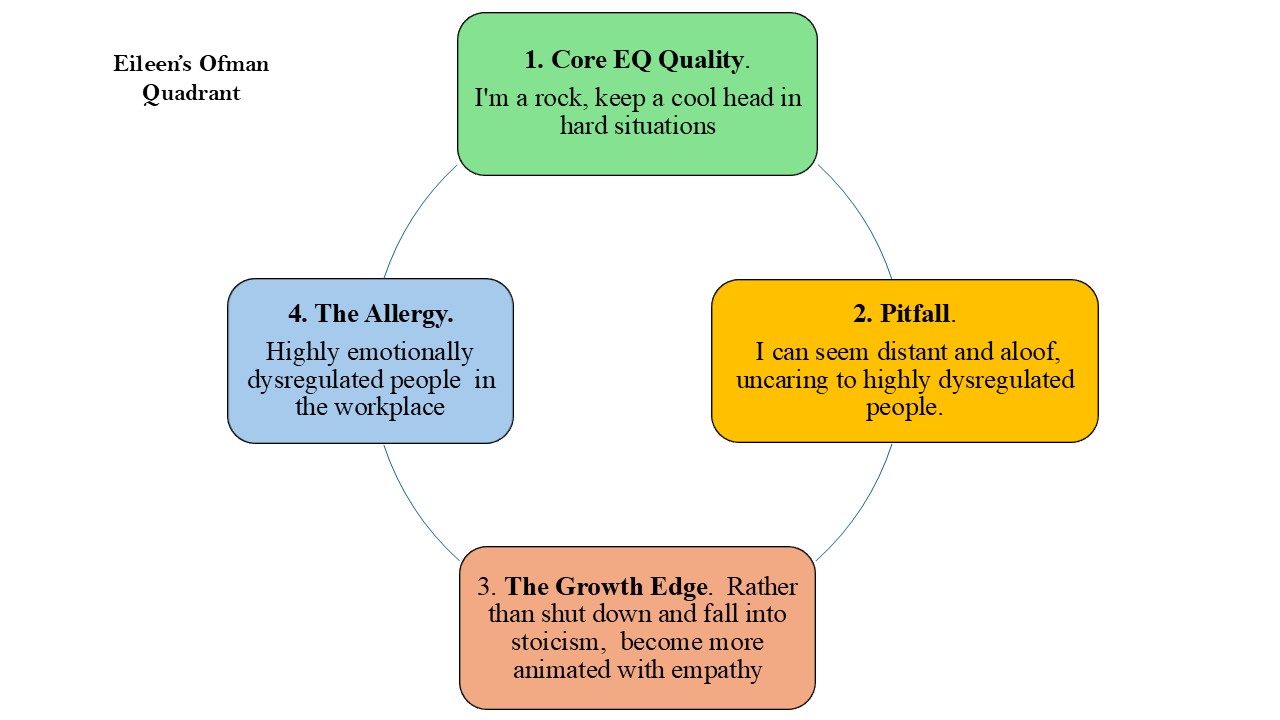Anyone can become angry—that is easy. But to be angry with the right person, to the right degree, at the right time, for the right purpose, and in the right way—this is not easy. Aristotle (384-322 BCE)
Emotional intelligence—our ability to read the room, know yourself, manage stress and build relationships—is crucial for success and wellbeing.
But here’s what nobody tells you: your greatest strength can morph into a blind spot when you are out in the wild and stressed.
The Ofman Quadrant takes us much deeper. It forces you to face an uncomfortable truth—the people who irritate you most are mirrors showing you exactly what you need to develop.
Here’s how it works: identify your core EI strength, then watch what happens when you overdo it. That’s your pitfall. Next, notice who pushes your buttons. That’s your allergy—and it’s pointing directly at your growth edge.
My example? I’m “the Rock”—emotionally regulated, calm under pressure. Sounds great, until stress hits and I can seem distant and aloof. And the people who are hardest for me to be around? The emotionally dysregulated.
The quadrant reveals the pattern: I’m allergic to the very quality I need to develop—empathy, animation, and emotional flexibility. My stoicism isn’t always strength; sometimes it’s just shutdown or a concealment.
The people who annoy you aren’t the problem. They’re the lesson. Your irritation is information. Your pitfall is a doorway.
Real emotional intelligence begins in the uncomfortable space between who you think you are and who you become under pressure. Fortunately, Our EI in not fixed like shoe size!
There are many ways to assess your EI, here is one for free at Truity Psychometrics
More Wellbeing Ideas
Noticing the Line
Dan Harris of 10% Happier and Brene Brown discussing her new book, Strong Ground: The Lessons of Daring Leadership, the Tenacity of Paradox, and the Wisdom of the Human Spirit.
Arthur Brooks on EI Practices
Notes on Being a Man, and Advice for Young Men Who Are Feeling Lost — Scott Galloway
Scott Galloway’s blog, “Notes on Being a Man…” offers an honest and compassionate look at modern masculinity—encouraging men to cultivate purpose, emotional depth, and integrity in a confusing world. It’s a valuable read for anyone seeking to understand the loneliness, comparison, and disconnection many young men experience. Galloway provides practical wisdom to foster emotional maturity, resilience, and a deeper sense of belonging.
Click HERE
The beginning of a habit is like an invisible thread, but every time we repeat the act, we strengthen the strand, add to it another filament, until it becomes a great cable and binds us irrevocably in thought and act. Dr. Orison Swett Marden, Author (1848-1924)

